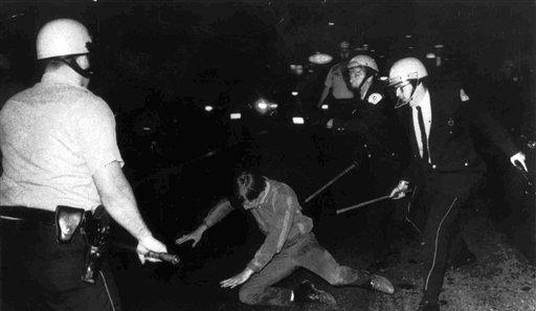Earlier this week, I reported here that at least one of this weekend’s London attackers was a “Known Wolf” — a person already known to UK authorities as a terror risk before the attack — just like the recent Westminster and Manchester terrorists:
At Least One London Bridge Terrorist Was a #KnownWolf — Just Like Manchester, Westminster, etc. https://t.co/m0eTQ5d1eU via @pjmedia_com
— Patrick Poole (@pspoole) June 4, 2017
But yesterday, we discovered just how much warning authorities had about terrorist Khuram Butt, a British citizen born in Pakistan. He had been referred to UK authorities at least twice:
London terrorist had twice been referred to police over his extremist views and thrown out of local mosque https://t.co/BLnhP1g05S
— The Telegraph (@Telegraph) June 5, 2017
Neighbors say they reported London attack suspect to authorities https://t.co/GRXx0Xhwh8
— NBC News World (@NBCNewsWorld) June 5, 2017
I've interviewed a man who said he reported one of the London bridge attackers to the extremism hotline 2 years ago. https://t.co/x6meURiX2T
— Rick (@rick_maj) June 5, 2017
"Mummy I want to be a Muslim" How alleged attacker was reported to police for trying to radicalise childrenhttps://t.co/LcdzvHIB5g
— The Telegraph (@Telegraph) June 4, 2017
Then it got worse: Butt had been featured in a Channel 4 documentary, “The Jihadis Next Door,” which tracked a group of ISIS supporters and was filmed over two years:
Terror suspect featured in Channel 4 documentary – video https://t.co/sF2z1mhDiI
— The Guardian (@guardian) June 5, 2017
https://twitter.com/TheSun/status/87187478250937958
The failure doesn’t end there. During the documentary, they pray with a jihadist flag:
London Bridge terror attack ringleader, 27, appeared in Channel 4 documentary last year praying to ISIS flag https://t.co/L3W7XLltfW pic.twitter.com/jAZ0XlRYQn
— Daily Mirror (@DailyMirror) June 5, 2017
In retrospect, this seems like a pertinent question for authorities:
Where are the jihadis and hate preachers who appeared alongside London Bridge ringleader in Channel 4 documentary? https://t.co/SUVmrKtDUx
— Daily Mail U.K. (@DailyMailUK) June 6, 2017
Butt had also tried to go to Syria to join ISIS:
London terrorist appeared in Channel 4 jihadi documentary and 'tried to go to Syria'https://t.co/44B4FdPQ1D
— The Telegraph (@Telegraph) June 5, 2017
It turns out he was the target of a two-year police probe:
London Bridge killer Khuram Butt slipped through net despite 2 year cop probe https://t.co/ShYKJ2aTWe pic.twitter.com/95yaE7qBN2
— Daily Mirror (@DailyMirror) June 5, 2017
And UK authorities had determined that Butt was “potentially one of the most dangerous extremists in the UK”:
@NicRobertsonCNN reports on @cnntoday #London attack ringleader Khuram Butt was identified as major potential threat https://t.co/yrJFYMvBG5
— CNN Today (@cnntoday) June 6, 2017
Butt was not only on the radar of UK authorities, but reportedly the FBI as well:
"F.B.I. Was Warned About London Attacker Khuram Butt in 2015" https://t.co/WrTQ7r4nVQ
— El_Grillo (@El_Grillo1) June 7, 2017
Despite this, Butt had potentially dangerous access to vital areas because of his job with the Tube.
He was also linked to the 7/7 bombers:
London Bridge attacker 'had access to tunnels under Parliament' as his 7/7 links are revealed https://t.co/S1nYoqYh61 pic.twitter.com/bgVeGTpg14
— Telegraph Breaking News (@TelegraphNews) June 6, 2017
And he had been reported to police for assaulting other Muslims:
"The police were very well aware of this guy." –@MaajidNawaz reveals one of the London attackers had previously attacked his staff member pic.twitter.com/uDDkh9L5JL
— FOX & friends (@foxandfriends) June 6, 2017
How police arrested 'hot-head' terrorist six months before London Bridge massacre – but let him go with a caution https://t.co/DNz8PqL0CK
— The Telegraph (@Telegraph) June 7, 2017
If you think that’s bad, consider that the second killer, Moroccan/Libyan Rachid Redouane, had been denied asylum by the UK in 2009:
London attacker Rachid Redouane refused UK asylum in 2009 https://t.co/XxvD3oV900 pic.twitter.com/lz71lYguSr
— Telegraph Breaking News (@TelegraphNews) June 6, 2017
#LondonBridge attacker Rachid Redouane also used the name Rachid Elkhdar #Libya #Morocco #UK
— Libya Al Hurra (@LibyaAlHurraTV) June 5, 2017
And it was revealed that, much like Manchester bomber Salman Abedi, he had fought in Libya with the Western-backed “rebels”:
London attacker fought in the Libya revolution against Gaddafi & then joined an anti-Assad terrorist group. https://t.co/g23WXjJL0P
— Max Abrahms (@MaxAbrahms) June 7, 2017
Like Redouane and Abedi, there are hundreds more Libyan fighters living in the UK who fought in Libya, creating a threat impossible to measure:
In Feb, half of some 850 Britons whom MI6 had green lighted to go to fight in Libya/Syria returned, consolidating domestic extremist threat https://t.co/d1xfmTQ3NX
— Dr Nafeez Ahmed (@NafeezAhmed) June 4, 2017
So if he had been denied asylum by the UK, what was he doing living there?
Because, as he had Irish citizenship, he had an EU residency card:
Rachid Redouane 'stayed in Britain through EU residency card granted in Ireland after being denied asylum' https://t.co/2tf348XeE7 pic.twitter.com/4oGyUS9qSH
— Independent.ie (@Independent_ie) June 6, 2017
London Bridge attacker Rachid Redouane foiled attempts to keep him out of UK by using an EU card granted in Ireland https://t.co/zNmvHBo4sS
— The Irish Sun (@IrishSunOnline) June 6, 2017
There are concerns that other potential terrorists may exploit the EU residency loophole:
Fears Ireland was UK gateway for London Bridge attacker https://t.co/YhEWWK7T4I
— Sky News (@SkyNews) June 7, 2017
Then there was the third attacker, Youssef Zaghba, who was an Italian citizen born in Morocco and who also “slipped through the net”:
The third London Bridge killer, Youssef Zaghba, had also ‘slipped through net’ https://t.co/RGSTjBVla6 pic.twitter.com/cUaBhAGQg2
— The Times (@thetimes) June 6, 2017
Neighbors testify, according to the media, that he was a “good boy”:
London attacker was "a good boy" who was "happy to say buongiorno," neighbors say https://t.co/jCTKYDvzA4 pic.twitter.com/BNjpDJ8Lrn
— Los Angeles Times (@latimes) June 7, 2017
And London Met police claim he was not a subject of interest:
Met Police confirm the third London attacker was Youssef Zhagba from east London – say he was not a police or MI5 subject of interest.
— LBC News (@LBCNews) June 6, 2017
This is where it gets really interesting.
In March 2016, Zaghba showed up at Bologna airport trying to board a flight to Istanbul with a one-way ticket to make his way to Syria to join ISIS.
During the course of his interrogation, he declared: “I am going to be a terrorist”:
Third London attacker told Italian police: "I’m going to be a terrorist" https://t.co/3Tc6vt6I7K pic.twitter.com/AH63Fu73IY
— POLITICO Europe (@POLITICOEurope) June 6, 2017
Zaghba had later planned to fly to Istanbul from Catania, Sicily, but he never showed up for the flight.
Notwithstanding two attempts to travel to Syria to join ISIS, having declared to officials “I am going to be a terrorist,” he was let into the UK:
London attacker let into UK despite saying he was 'going to be a terrorist' https://t.co/MojNtBXMKn pic.twitter.com/qeZGTuhEH8
— Telegraph Breaking News (@TelegraphNews) June 6, 2017
According to The Guardian, Italian authorities had let the UK know about Zaghba’s extremist leanings:
After he was stopped at Bologna airport, details about him were uploaded to a Europe-wide database of potential jihadis, although Scotland Yard said in a statement: “He was not a police or MI5 subject of interest.”
His mother said he had remained under monitoring by Italian intelligence ever since […]
The Italian security services sent an alert to London with the information gathered from his phone and from other checks carried out in Bologna, understood to have included searches of his mother’s home, according to the paper.
Zaghba apparently tried again to reach Istanbul, reserving a ticket to fly from Catania in Sicily, but never took the flight.
An Italian official told the Guardian that Italian authorities had alerted their British counterparts when Zaghba moved to London. But it is unclear what form that alert took.
Needless to say, there are considerable questions to be asked about the handling of each of these cases by UK authorities as Prime Minister Theresa May faces a general election within days:
https://twitter.com/ImAndrewMarcus/status/871789475445301248
#UPDATE Third London attacker named as Youssef Zaghba, anger grows over security flaws https://t.co/BrJupD08rs #LondonBridge pic.twitter.com/ORWLU5o43i
— AFP news agency (@AFP) June 6, 2017
The London assailants had bumped into the the country’s security net, but alarms were played down, ignored or missed https://t.co/DLKLCBqmKv
— New York Times World (@nytimesworld) June 7, 2017
Lest we be too preachy with our British cousins, it bears mentioning that our record with the “Known Wolf” problem in the U.S. is just as bad:
'KNOWN WOLF' TERROR: A Dozen Cases of FBI Failure on Obama's Watch https://t.co/dvzFUQpECJ
— Patrick Poole (@pspoole) September 29, 2016
I’ve been reporting on the “Known Wolf” problem here at PJ Media since 2014:
‘Lone Wolf,’ or ‘Known Wolf’? The Ongoing Counter-Terrorism Failure http://t.co/pV6wP3wE2Q #tcot
— PJ Media (@PJMedia_com) October 24, 2014
After the Westminster and Orly airport attacks, I asked “[h]ow many more must die” before Western authorities acknowledge, let alone deal with, the “Known Wolf” issue?
5 Days and 2 'Known Wolf' Terror Attacks, Yet No Apparent Concern from Western Govts — How Many More Must Die? https://t.co/bYMXtsh0o2
— Patrick Poole (@pspoole) March 23, 2017
The answer to that question from the attacks over the past 90 days has been: many more.
The three terrorists didn’t just “slip through the net.” We now know that Western law enforcement, intelligence, and national security agencies are fundamentally broken at a time when the threat from these attacks is escalating rapidly.
We are less than a week away from the one-year anniversary of the Orlando Pulse night club attack by Omar Mateen, who had been investigated twice by the FBI before he killed 49 Americans:
Orlando Night Club Attack By 'Known Wolf' Terrorist Previously Investigated by FBI https://t.co/TGFZK1mdTv #homelandsecurity
— PJ Media (@PJMedia_com) June 12, 2016
The Orlando attack was the largest loss of life from a terror attack in the U.S. since 9/11. Yet a year has passed, and nothing has changed — except the exploding growth of the threat internationally.
The lethal consequences of refusing to address the “Known Wolf” issue leaves citizens more vulnerable than ever before. And the nature of the “Known Wolf” terrorism threat we face is greater than we could possibly imagine.








Join the conversation as a VIP Member